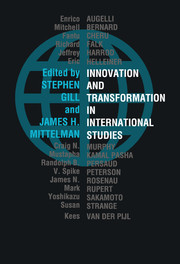Book contents
- Frontmatter
- Contents
- List of contributors
- Preface
- Acknowledgements
- Part I Rethinking and remaking the roots of global social and political theory
- Part II Political economy: the social and ecological anatomy of transformation
- Part III Transformation, innovation and emancipation in global political and civil society
- 9 Globalisation and contested common sense in the United States
- 10 The silent revolution and the weapons of the weak: transformation and innovation from below
- 11 Frantz Fanon, race and world order
- 12 Whose crisis? Early and post-modern masculinism
- Part IV Reflections on global order in the twenty-first century
- References
- Index of names
- Index of subjects
12 - Whose crisis? Early and post-modern masculinism
Published online by Cambridge University Press: 05 July 2011
- Frontmatter
- Contents
- List of contributors
- Preface
- Acknowledgements
- Part I Rethinking and remaking the roots of global social and political theory
- Part II Political economy: the social and ecological anatomy of transformation
- Part III Transformation, innovation and emancipation in global political and civil society
- 9 Globalisation and contested common sense in the United States
- 10 The silent revolution and the weapons of the weak: transformation and innovation from below
- 11 Frantz Fanon, race and world order
- 12 Whose crisis? Early and post-modern masculinism
- Part IV Reflections on global order in the twenty-first century
- References
- Index of names
- Index of subjects
Summary
In chapter 1 of this volume, Stephen Gill characterises current transformations as ‘a reordering and redefinition of the basic components of social reality … involving] changes in consciousness and processes of objectification’. Having noted the sense of uncertainty attending these mutations, he suggests that ‘the contemporary configuration of world order is in structural crisis’.
I endorse Gill's sense of the profundity (depth, extent, scope, significance) of today's transformations and, implicitly, the challenges they pose to conventional theory/practice. What I would additionally emphasise is the inseparability of empirical, conceptual and ‘socio-psychological’ developments: how changes/events in the world ‘out there’ produce and are produced by changes in how we conceptualise and who we think we are; how external objective social change and internal subjective self change are interactive (Bologh, 1987: 147); how ways of being, ways of thinking and ways of identifying refer to different yet reciprocally constituted dimensions of social relations.
I stress these points because International Relations scholars so frequently appear to resist and/or deny them. Yet I am persuaded that we cannot begin to adequately comprehend, much less address, the current ‘crisis’ until we abandon positivist binaries and take relational thinking seriously (e.g., Peterson, 1992a). This involves understanding the world ‘out there’ (practices, institutions, structures of social re/production), how we think (meaning systems, ideologies, paradigms) and who we are (subjectivity, agency, self and collective identities) as interacting dimensions of social reality.
- Type
- Chapter
- Information
- Innovation and Transformation in International Studies , pp. 185 - 202Publisher: Cambridge University PressPrint publication year: 1997
- 8
- Cited by



